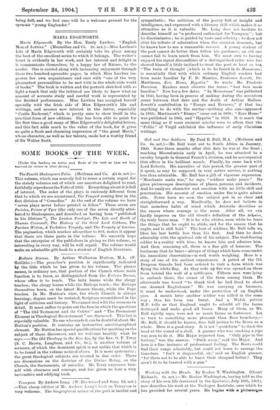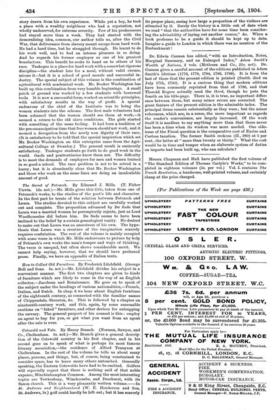Working with the Hands. By Booker T. Washington. (Grant Richards.
Os. net.)—Mr. Booker Washington, having told us the story of his own life (reviewed in the Spectator, July 13th, 1901), now describes his work at the Tuskegee Institute, over which lie has presided for several years. lie begins with a picturesque
story drawn from his own experience. While yet a boy, he took a place with a wealthy neighbour who had a reputation, not wholly undeserved, for extreme severity. Few of his predecessors had stayed more than a week. They had started with the demoralising idea, common, our author tells us, after the Civil War, that deliverance from slavery meant escape from hard work. Be had a hard time, but he struggled through. He learnt to do his work well, and to feel an intense pleasure in so doing. And he regards his former employer as one of his greatest benefactors. This benefit he seeks to hand on to others of his race. Tuskegee is a place for hard work with a somewhat rigorous discipline—the student late for a meal, without valid excuse, misses it—but it is a school of good morals and successful in- dustry. The special subject of this volume is the combination of agricultural with academical work. Mr. Booker Washington has built up this combination from very humble beginnings. A. small patch of ground was worked by a few students with• borrowed tools. It is now a successful farm, worked on scientific principles, with satisfactory results in the way of profit. A special endeavour of the chief of the Institute was to bring the women students into the scheme. The first male volunteers had been ashamed that the women should see them at work,—it seemed a return to the old slave conditions. The girls started with something of the same feeling. It had been a tradition of the pre-emancipation time that free women should not work, and it seemed a derogation from the newly won dignity of their race. (It is satisfactory to be told that the special inspiration which set Mr. Booker Washington on this enterprise came from the Agri- cultural College at Swanley.) The general result is eminently satisfactory. Tuskegee students go forth to do good work in the world. Gaols and penitentiaries know them not. The difficulty is to meet the demands of employers for men and women trained in so good a school. The race problem is not to be solved in a hurry ; but it is abundantly clear that Mr. Booker Washington and those who work on the same lines are doing an incalculable amount of good.







































 Previous page
Previous page